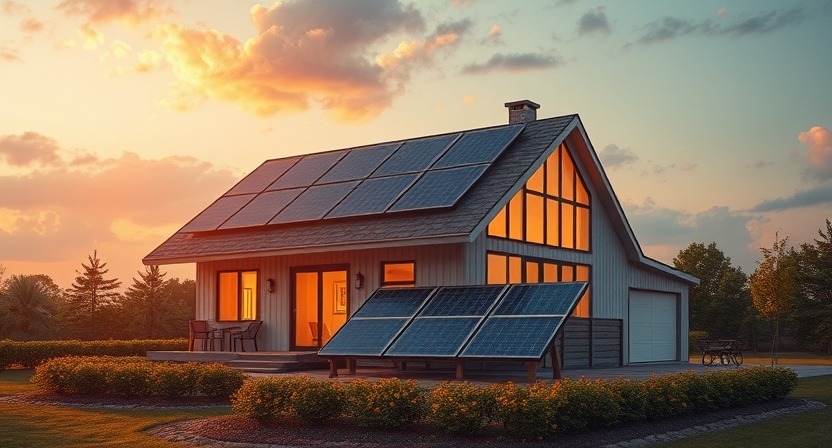As we step into 2025, the conversation around renewable energy continues to gain momentum, with solar-powered homes at the forefront. The question many homeowners are asking is: Are solar-powered homes a good investment this year? Let’s explore the financial and environmental benefits of embracing solar energy for residential properties.
The Rising Popularity of Solar Energy
Solar energy has moved from being a niche solution to becoming a mainstream choice for powering homes. Thanks to technological advancements, government incentives, and growing awareness about climate change, more households are considering solar panels as a viable alternative to traditional energy sources.
In Australia, for instance, where sunlight is abundant, solar panel installations have surged. By 2025, approximately 3.5 million homes in the country are expected to have rooftop solar systems, demonstrating the significant shift toward greener energy solutions.
Financial Benefits of Solar-Powered Homes
One of the primary reasons homeowners turn to solar energy is the potential for significant cost savings. Here’s how going solar can impact your finances:
1. Reduced Energy Bills
Solar panels harness energy from the sun, reducing your reliance on grid electricity. With energy prices on the rise, generating your own power can result in substantial savings. For example, a household with a 6.6kW solar system could save up to $1,500 annually on electricity bills.
2. Attractive Government Incentives
In 2025, many governments worldwide continue to offer incentives to encourage solar adoption. In Australia, the Small-Scale Renewable Energy Scheme (SRES) provides rebates, significantly lowering the upfront cost of solar panel installations. These incentives significantly lower the cost of switching to solar energy, making it more accessible than ever.
3. Increased Property Value
Solar-powered homes are highly attractive to eco-conscious buyers. Studies show that properties equipped with solar systems often sell at a premium compared to those without. This means investing in solar panels can boost the resale value of your home.
4. Long-Term Investment Returns
While the initial cost of installing solar panels can be high, the long-term returns are worth it. With a lifespan of 20-25 years, most systems pay for themselves within 5-7 years through energy savings. The remaining years essentially offer free electricity.
Environmental Benefits: A Step Towards Sustainability
Beyond the financial advantages, solar energy contributes to a healthier planet. By switching to solar power, homeowners can:
1. Reduce Carbon Emissions
Traditional energy sources, like coal and natural gas, emit significant amounts of carbon dioxide, contributing to global warming. Solar power, on the other hand, is a clean, renewable energy source that drastically reduces your home’s carbon footprint.
2. Conserve Natural Resources
Fossil fuels are limited resources that require millions of years to develop. Solar energy relies on sunlight—an abundant and inexhaustible resource. By adopting solar power, you contribute to preserving these valuable resources for future generations.
3. Minimize Air and Water Pollution
Unlike fossil fuel power plants, solar panels don’t release harmful pollutants into the air or water. This leads to cleaner air, healthier ecosystems, and a better quality of life for everyone.
Debunking Common Myths About Solar Energy
Despite its benefits, some homeowners hesitate to invest in solar energy due to misconceptions. Let’s address a few:
Myth 1: Solar Panels Are Too Expensive
While the upfront cost can seem steep, falling prices and government incentives have made solar systems more accessible. Financing options, such as solar loans or leases, further reduce the financial burden.
Myth 2: Solar Panels Don’t Work in Cloudy Weather
Solar panels can generate energy even on cloudy days. While output may be lower, they still capture diffuse sunlight to power your home.
Myth 3: Maintenance Is Complicated
Solar panels require minimal maintenance. Regular cleaning and occasional check-ups are usually sufficient to keep them functioning efficiently for decades.
Is Now the Right Time to Go Solar?
With climate concerns mounting and energy costs continuing to rise, 2025 is an excellent time to consider solar power. Technological innovations, like more efficient photovoltaic cells and better battery storage solutions, are making solar energy more reliable and effective.
For homeowners aiming for energy independence, pairing solar panels with battery storage systems is a game-changer. Batteries store excess energy generated during the day, allowing you to power your home at night or during blackouts.
Making the Switch: What to Consider
If you’re ready to invest in solar power, here are some factors to keep in mind:
- Upfront Costs and Financing Options: Research installation costs and available incentives. Compare quotes from reputable installers.
- Energy Needs: Assess your household’s energy consumption to determine the appropriate system size.
- Roof Condition and Orientation: Ensure your roof is in good shape and receives adequate sunlight.
- Warranty and Lifespan: Look for systems with solid warranties and proven durability.
- Battery Storage: Decide if you want to add a battery to store surplus energy.
The Bottom Line
Solar-powered homes are more than just an eco-friendly choice; they’re a smart financial decision for homeowners in 2025. By reducing energy bills, increasing property value, and contributing to a sustainable future, solar energy offers benefits that extend beyond your wallet.
Whether you’re motivated by the environmental impact or the promise of long-term savings, now is the time to harness the power of the sun. Investing in solar energy isn’t just about adapting to the future; it’s about creating a brighter and cleaner one.







